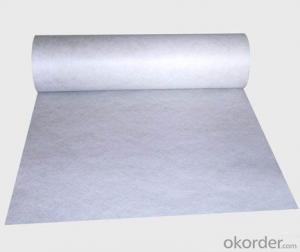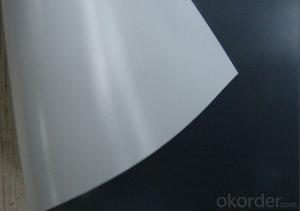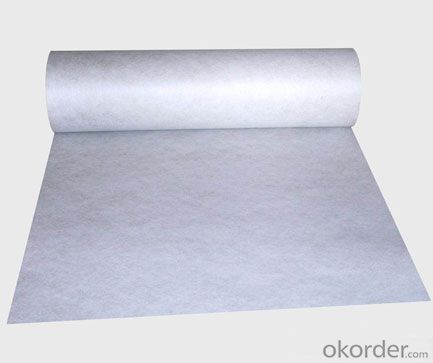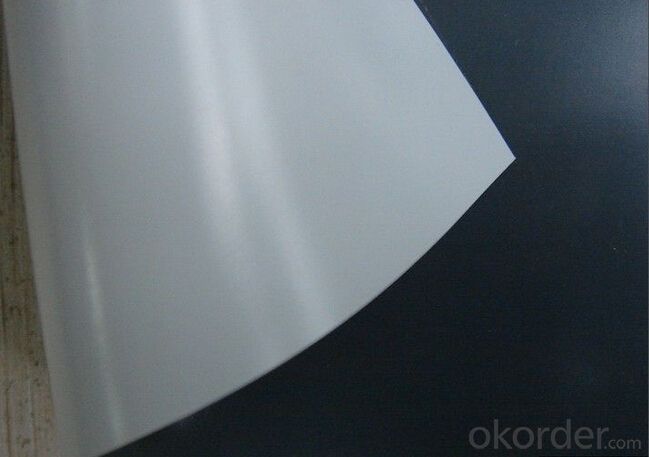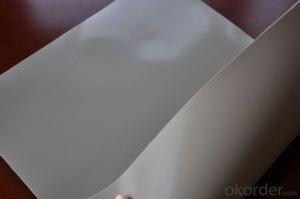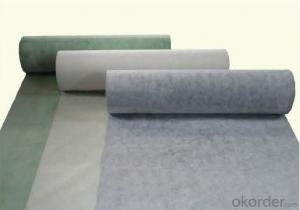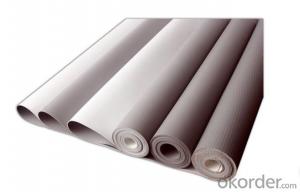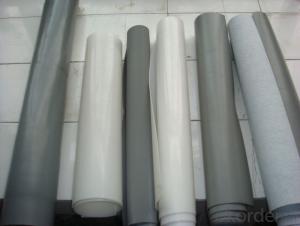PVC New Polymer Waterproofing Membrane Roll
- Loading Port:
- China main port
- Payment Terms:
- TT OR LC
- Min Order Qty:
- 5000 m²
- Supply Capability:
- 100000 m²/month
OKorder Service Pledge
OKorder Financial Service
You Might Also Like
1.Technical data of PVC Membrane
Item | Specification |
Length | 20m |
Width | 1.05m, 2.05m,2.1m |
Thickness | 0.8mm,1.0mm;1.2mm;1.5mm;2.0mm |
2. Introduction for PVC Waterproofing Membrane
Excellent anti-aging property.
Puncture- resistant.
Welding construction,
High tensile strength, good elongation, good dimensional stability.
Good plasticity.
It has self-extinguishing from fire property.
Materials surface is smooth, fast color, stain resistance.
More wide, Wastage become less when being used.
3.Characteristic of PVC Membrane
1.Strong tensile strength, high elongation, can fit big deformation of substrates.
2.Excellent anti-extreme weather property, can adapt to various environment temperature difference.
3.Suitable for exposed projects with long lifetime and good anti-aging property.
4.Can be welded firmly and reliably.
5.Outstanding root penetration resistance, best choice for planted roofs.
6.Simple and fast construction without pollution.
7.Great plasticity and fast treatment with corners and details.
4.Applicable scope of PVC Membrane
PVC sheet forms an effective barrier to liquid water or water vapor in the roof construction for industrial and civil engineering, underground engineering such as subway& tunnel, water conservancy such as water pools & ditch, shelter, grain depot, land filling, dyke, sewage treatment and basement.
5. FAQ of PVC Waterproofing Membrane
a.Can we get some samples before place order?
Answer: We can send the free samples to you by freight collect.
b.How many years can your PVC membrane guarantee?
Answer: We will guarantee the quality for 5 years at least.
c.Which countries you ever export the product?
Answer: We export the PVC membrane to South Africa, Middle east and even European countries.
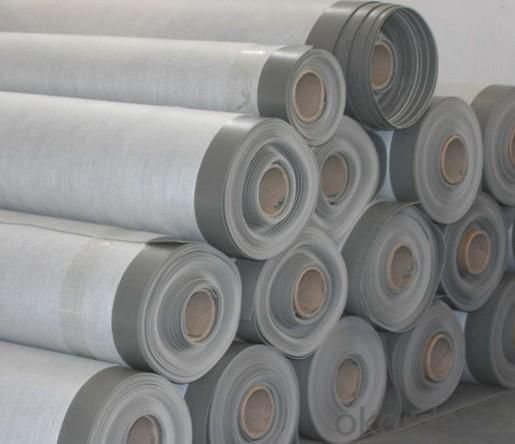
- Q: 1.2 thick synthetic polymer waterproofing membrane two weight how to count
- Different materials of the coil its unit weight is not the same, and some polymer membrane with self-adhesive or empty shop, without adhesive, so according to the specific material and paste method for calculation, the above calculation, the exact calculation can be based on the actual The material was measured for its weight per unit weight and then the lap coefficient and binder were calculated.
- Q: Can a waterproofing membrane be used for modular buildings or container homes?
- Yes, a waterproofing membrane can be used for modular buildings or container homes. It provides a protective layer against moisture, preventing water damage and enhancing the durability of the structure.
- Q: Can a waterproofing membrane be used in coastal areas?
- Yes, a waterproofing membrane can be used in coastal areas. These membranes are specifically designed to withstand harsh weather conditions, including exposure to saltwater, high humidity, and extreme temperatures. They provide an effective barrier against water penetration and can protect structures from the damaging effects of coastal environments.
- Q: Can a waterproofing membrane be used on metal block surfaces?
- Yes, a waterproofing membrane can be used on metal block surfaces. Waterproofing membranes are designed to create a barrier against water and moisture, and they can be applied to a variety of surfaces, including metal. The membrane will adhere to the metal surface, creating a waterproof layer that helps prevent water infiltration and protect the metal from rusting or corrosion. However, it is important to ensure that the metal surface is clean, dry, and properly prepared before applying the waterproofing membrane to ensure proper adhesion and effectiveness. Additionally, it is recommended to consult with a professional or refer to the manufacturer's instructions for specific guidance on using a waterproofing membrane on metal block surfaces.
- Q: Can a waterproofing membrane be painted or covered with a protective layer?
- Yes, a waterproofing membrane can be painted or covered with a protective layer. However, it is important to choose the right type of paint or protective layer that is specifically designed for use with waterproofing membranes. This ensures that the integrity of the membrane is not compromised and that it continues to provide effective protection against water damage. It is also important to follow the manufacturer's guidelines and recommendations when applying paint or a protective layer to the membrane. This may include proper surface preparation, application techniques, and maintenance instructions. By following these guidelines, the waterproofing membrane can be painted or covered with a protective layer without compromising its effectiveness.
- Q: Are waterproofing membranes suitable for historical preservation projects?
- Waterproofing membranes can be suitable for historical preservation projects, depending on the specific circumstances and goals of the project. Waterproofing membranes are designed to provide a protective barrier against water infiltration, which can help to prevent damage to historical structures caused by moisture. In some cases, historical buildings may have existing waterproofing systems that are deteriorated or no longer effective. In these situations, the use of modern waterproofing membranes can be a viable option to protect and preserve the structure. These membranes can be installed discreetly, without altering the original appearance or architectural integrity of the building. However, it is crucial to approach the use of waterproofing membranes in historical preservation projects with caution. The potential impact on the authenticity and historical value of the structure must be carefully evaluated. Some historical buildings may have unique construction methods or materials that require specialized preservation techniques. In such cases, alternative preservation methods that do not involve the use of membranes may be more appropriate. Additionally, it is important to consider the long-term consequences and maintenance requirements of waterproofing membranes. Some membranes may have a limited lifespan, and periodic inspections and maintenance may be necessary to ensure their continued effectiveness. This ongoing maintenance should be factored into the overall preservation plan and budget. Ultimately, the decision to use waterproofing membranes in historical preservation projects should be based on a thorough assessment of the specific needs and characteristics of the building, as well as the preservation objectives. Consulting with preservation experts, architects, and engineers can help to determine the most suitable approach for each unique project.
- Q: Can a waterproofing membrane be used for swimming pool decks and patios?
- Swimming pool decks and patios are commonly subjected to water exposure, which can cause damage. To counter this, a waterproofing membrane can be utilized. This membrane serves as a shield to prevent water penetration and safeguard the underlying structure. Whether it's due to splashing or rainfall, these areas are prone to water-related issues like cracking, mold growth, and deterioration. By applying a waterproofing membrane, you can effectively protect your pool deck or patio from such problems. This protective barrier hinders water from seeping into the concrete or other materials, thus prolonging the lifespan of these surfaces. To guarantee optimum performance and durability, it is crucial to select a high-quality, outdoor-specific waterproofing membrane.
- Q: Can a waterproofing membrane be used on retaining walls?
- Using a waterproofing membrane on retaining walls is possible. Retaining walls often face moisture and hydrostatic pressure, which can result in water infiltration and structural decay. By applying a waterproofing membrane to the retaining wall, water penetration can be prevented, shielding the wall from moisture-related harm and extending its lifespan. The membrane acts as a barrier, stopping water from seeping into the wall and causing problems like efflorescence, cracks, or erosion. It is crucial to select a waterproofing membrane that is designed specifically for below-grade applications and can withstand the pressure exerted by the soil being retained. Moreover, proper installation techniques and suitable drainage systems should be taken into account to ensure the effectiveness of the waterproofing membrane on retaining walls.
- Q: Can a waterproofing membrane be used for a tunnel waterproofing system?
- Yes, a waterproofing membrane can be used for a tunnel waterproofing system. A waterproofing membrane is a flexible and durable material that is designed to prevent the ingress of water into a structure. It is commonly used in various construction projects, including tunnels, to provide an effective barrier against water penetration. In a tunnel waterproofing system, the membrane is typically applied to the exterior walls and floor of the tunnel. It is installed in multiple layers to ensure a watertight seal and to provide long-term protection against water infiltration. The membrane acts as a barrier, preventing water from seeping through the concrete or other tunnel materials. There are different types of waterproofing membranes available, including bituminous, PVC, and liquid-applied membranes. The selection of the appropriate membrane depends on factors such as the type of tunnel construction, the level of water pressure, and the specific requirements of the project. It is important to carefully choose and install the waterproofing membrane to ensure its effectiveness. Proper surface preparation, including cleaning and smoothing the substrate, is essential for achieving a good bond between the membrane and the tunnel surface. Additionally, attention should be given to properly sealing any joints, penetrations, or connections in the membrane to prevent water from finding its way through. Overall, a waterproofing membrane is a reliable and widely used solution for tunnel waterproofing systems. When properly selected and installed, it provides an effective barrier against water ingress, ensuring the durability and longevity of the tunnel structure.
- Q: Can a waterproofing membrane be used on asphalt surfaces?
- Yes, a waterproofing membrane can be used on asphalt surfaces. Waterproofing membranes are often used to protect various surfaces, including asphalt, from water damage. They create a barrier that prevents water from seeping into the asphalt, reducing the risk of cracks, deterioration, and other forms of damage caused by moisture.
Send your message to us
PVC New Polymer Waterproofing Membrane Roll
- Loading Port:
- China main port
- Payment Terms:
- TT OR LC
- Min Order Qty:
- 5000 m²
- Supply Capability:
- 100000 m²/month
OKorder Service Pledge
OKorder Financial Service
Similar products
Hot products
Hot Searches
Related keywords
